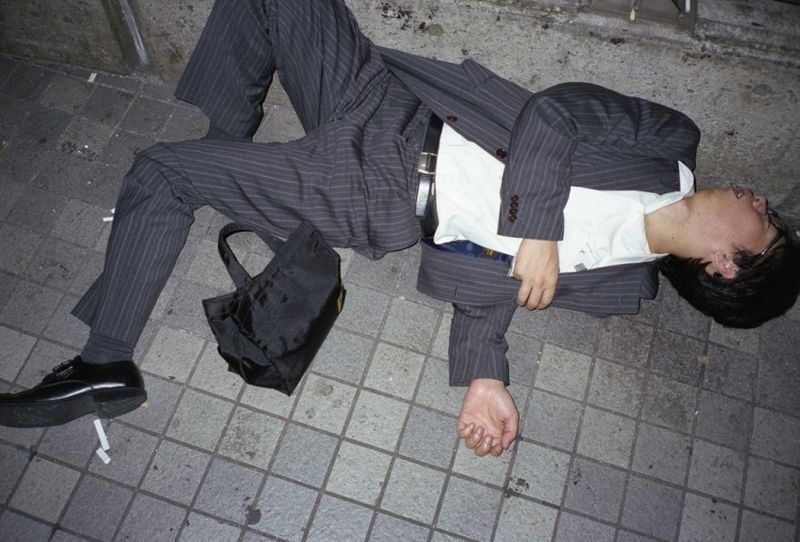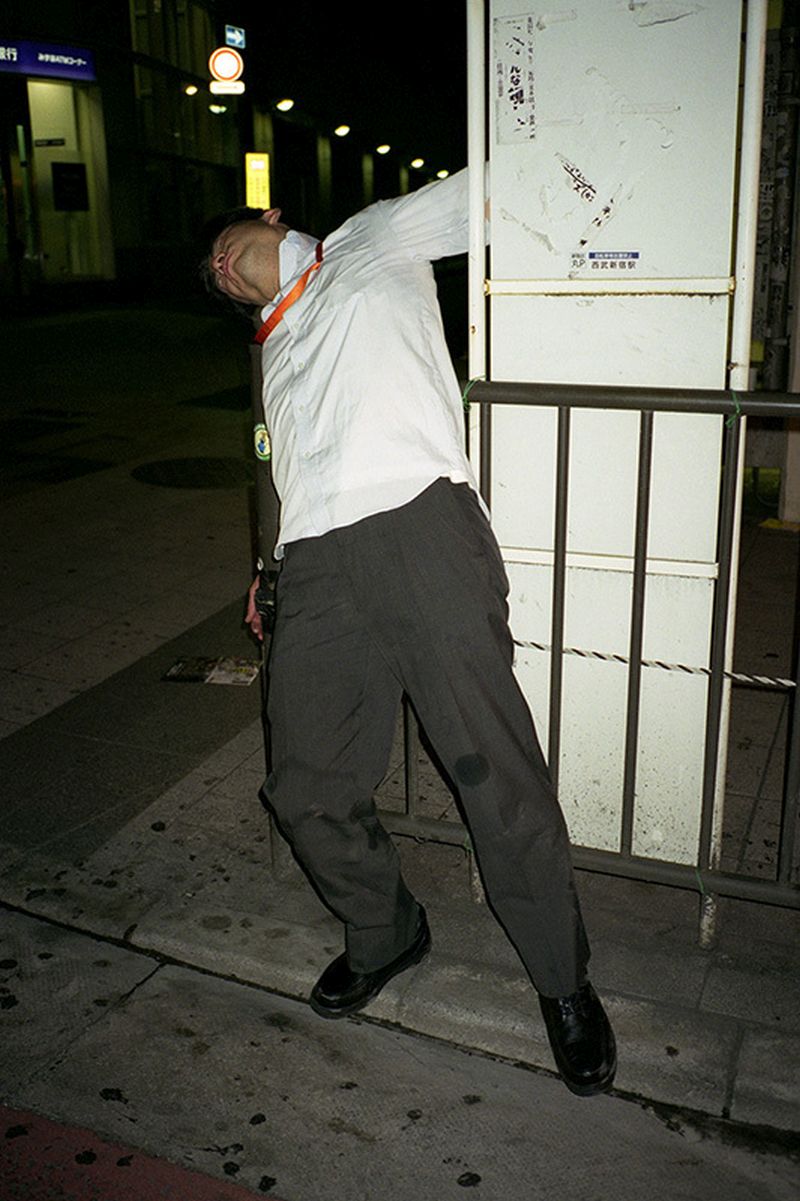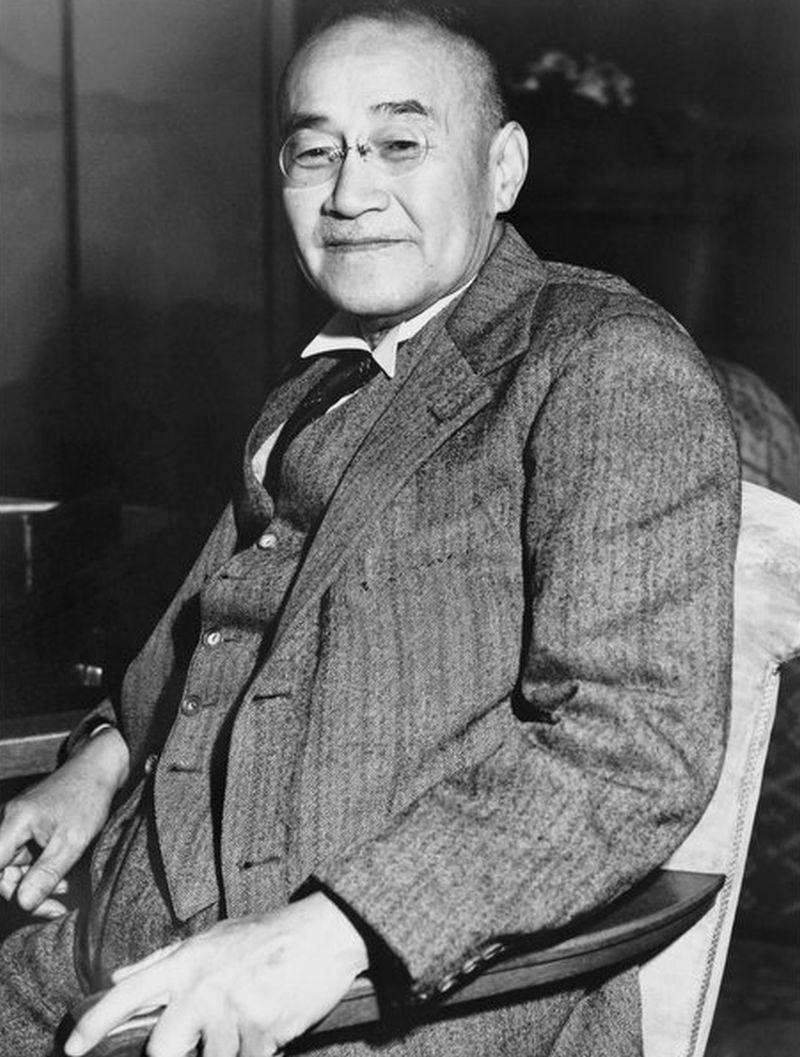Corporate culture, be it anywhere in the world, can be inevitably cruel and demanding. But in Japan, the case is worse. Even in incorporate environment, Japan’s ‘salarymen’ work for some of the longest hours in the world. To release stress and tension, they turn to alcohol after working hours. This results in slumbering Japanese men – at random corners on the streets. Photographer Pawel Jaszczuk captures this beautifully (and sadly) in a photo series for his next book ‘High Fashion.’
The contrast is everything
 Image Source : photobookstore.co.uk
Image Source : photobookstore.co.uk
During the time Jaszczuk was in Tokyo, he observed a unique, unimaginable phenomenon on the streets of Japan. The image – of men in suits- lying on streets caught his attention. Jaszczuk said that it was the contrast – between the well dressed ‘salarymen’ of Japan and the dry, hostile ground of the streets – that helped him look at Japan’s work culture in an entirely new light. He has been photographing these men – lying exhausted on the streets- since almost 10 years now.
These businessmen and salarymen in Japan don’t only find space for their sleep on the streets. Sometimes, they also find a temporary abode on the benches, platforms, and even the subways of the metropolitan city. Meanwhile, other Japanese salarymen fail to find a spot to lie on. So, they doze off while leaning against a railing somewhere.
These Japanese slumbering businessmen are often found in deep sleep inside railway stations or outside the karaoke bars. Enter Shinjuku and Shimbaji – two of the most industrialized areas in Tokyo- and you will find a host of dozing employees.
Why is Japan’s work culture so worrisome?
Image Source : payload.cargocollective.com
When Jaszczuk clicked photographs of the slumbering salary men in Japan, it was usually nighttime. So, to capture the essence and spirit of his photo, Jaszczuk used little flash lights before clicking the shot. But these flashlights never bothered those who lay sleeping – not even once, not even a little. Imagine how tired and exhausted these businessmen must be?
Japan’s work culture demands a lot from its employees. The fact, that many employees have even died under the stress and pressure that overwork places on them, is truly worrisome. That the Japanese even have a name for this tragic phenomenon (it is called karoshi) is highly disturbing. Karoshi translates to ‘death by overwork’.
In 2016, a report was made public. 10,000 Japanese participants answered the questions about Japan’s work culture. Almost 2,000 Japanese admitted that they worked for 80 hours over time in a month. And that’s the least they did. It doesn’t help that the Japanese also have a term for act of people who sleep during duty (or sleep in public). It is called ‘inemuri’, and it is a highly praised and respected concept in Japan – because it shows how diligently a person has worked the whole day. That this practice of ‘inemuri’ dates back to almost 1000 years shows how Japan’s work culture has demanded hard work and tireless efficiency from its employees since the beginning. This, in itself, is worrisome.
The origin of Japan’s work culture
Image Source : ak1.ostkcdn.com
The modern-day Japanese work culture dates back to the Post Second World War. Japan’s economy was obliterated. The Japanese Prime Minister at the time, Shigeru Yoshida, urged the Japanese population to devote more and more time to their work. For that, he also assured incentivization. Today, Japan is the third largest economy in the world. However, it comes at a huge cost.
Japan has turned its manpower into machines. Jaszczuk said that the slumbering businessmen do not wake up even after the first sunrays are out. In fact, whenever they do wake up, they simply walk back to their offices – carrying with them a suitcase of paperwork, stress and exhaustion. Numerous Japanese employees have also succumbed to strokes and heart attacks. In July 2013, Miwa Sado, a journalist in Japan, died at only 31, after reportedly working for more than 159 hours overtime. Sado’s employer valued her life and work at $5000 USD, which were paid as fines.
In 2017, the Government also introduced Premium Friday Plan, whereby it allows the employees to leave from work by 3.00 P.M. on the last Friday of every month. But so far, it has not seem much success. Working overtime has become an inescapable aspect of Japan’s work culture. Jaszczuk wanted to convey exactly that through his photos.
The problem with Japan’s work culture
 Japan’s work culture has no space for health and wellness of the workers. In an attempt to rebuild its economy, Japan has sadly ignored the ones who run it – the citizens. These employees work for more than 14 hours a day, and sleep for less than 4. They have turned into mechanical robots – grinding endlessly for a corporate life, which can replace them in just a week.
Japan’s work culture has no space for health and wellness of the workers. In an attempt to rebuild its economy, Japan has sadly ignored the ones who run it – the citizens. These employees work for more than 14 hours a day, and sleep for less than 4. They have turned into mechanical robots – grinding endlessly for a corporate life, which can replace them in just a week.
Japan’s work culture is tireless. No. Japan’s work culture is tiresome. It let its employees believe that the professional life, success and failure, is the be-all-and-end-all. That taking time out from work is a shame of the highest degree. That the one who is not absorbed in his/her work is lax and laidback, thus, he/she can demand no praise or respect from anyone around.
Japanese work culture tells its employees that you were born to work and you will die working. This belief is a matter of pride for a lot of Japanese men and women. They are so much in awe of performing their duty on a daily basis that any failure of doing so on their part makes them want to die of shame and embarrassment.
But this is the problem with the Japanese work culture. It takes itself too seriously. In a bid to turn into a dominating world economy, it has sacrificed quite a bit of humanity. Japan is a country that stands as an example of discipline, manners, and steadfastness. But this is also the Japan which overlooks how exhausted and worn-out its citizens are. If Japan’s work culture continues to do so, one day, it will be a developed nation with tired humans – hollow and futile. This sad scenario of Japanese work culture has to vanish. Or else, Japan will gain economic power, but lose its human value.






